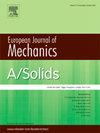通过考虑前体纤维的粘弹性行为,对扭曲和盘绕聚合物致动器进行驱动响应分析
IF 4.4
2区 工程技术
Q1 MECHANICS
引用次数: 0
摘要
扭曲盘绕聚合物致动器(TCPA)是一种人工肌肉,主要由粘弹性聚合物原纤维组成。为了预测前体纤维的机械变形,我们开发了一种积分形式的粘弹性构成模型。该模型成功地解释了第一周期效应和原纤维在玻璃化温度附近的蠕变变形。结合 Gao 和 Wang 的多层模型(2024 Smart Mater. Struct.我们注意到,TCPA 的驱动应变对加热和冷却循环很敏感。当循环持续时间较短时,所提出的粘弹性模型可简化为线性弹性模型。详细介绍了粘弹性构成模型的数值实现,并在聚丙烯和聚酰胺 66 两种聚合物材料上进行了验证。所提出的构成模型可以有效预测 TCPA 在复杂加载条件下的驱动响应。本文章由计算机程序翻译,如有差异,请以英文原文为准。
Driving response analysis of twisted and coiled polymer actuators by considering the viscoelastic behavior of their precursor fibers
Twisted and coiled polymer actuators (TCPA) represent a type of artificial muscle predominantly composed of viscoelastic polymers in their precursor fibers. An integral form of the viscoelastic constitutive model has been developed to predict the mechanical deformation of the precursor fibers. The model successfully accounts for the first-cycle effect and the creep deformation near the glass transition temperature of the precursor fibers. Combined with the multilayer model by Gao and Wang (2024 Smart Mater. Struct. 33 045031), which predicts the effective mechanical and thermal properties of TCPA, the proposed viscoelastic constitutive model accurately predicts the thermo-mechanical response of TCPA under the heating and cooling cycle and applied loads. It is noted that the driving strain of TCPA is sensitive to the heating and cooling cycles. When the cycle duration is short, the proposed viscoelastic model can be simplified to a linear elastic model. The numerical implementation of the viscoelastic constitutive model is detailed, with validation conducted on two polymer materials, polypropylene, and polyamide 66. The proposed constitutive model can effectively predict the driving response of TCPA under complex loading conditions.
求助全文
通过发布文献求助,成功后即可免费获取论文全文。
去求助
来源期刊
CiteScore
7.00
自引率
7.30%
发文量
275
审稿时长
48 days
期刊介绍:
The European Journal of Mechanics endash; A/Solids continues to publish articles in English in all areas of Solid Mechanics from the physical and mathematical basis to materials engineering, technological applications and methods of modern computational mechanics, both pure and applied research.

 求助内容:
求助内容: 应助结果提醒方式:
应助结果提醒方式:


